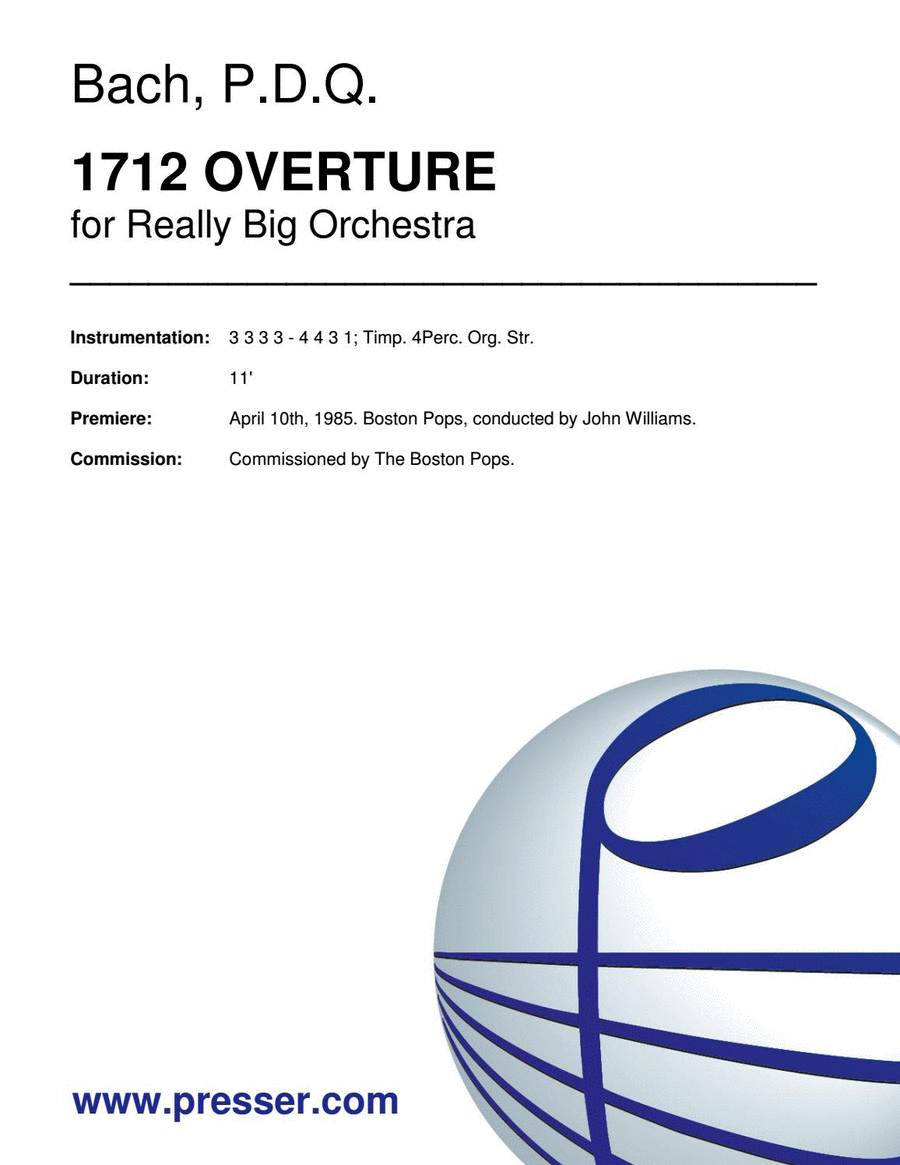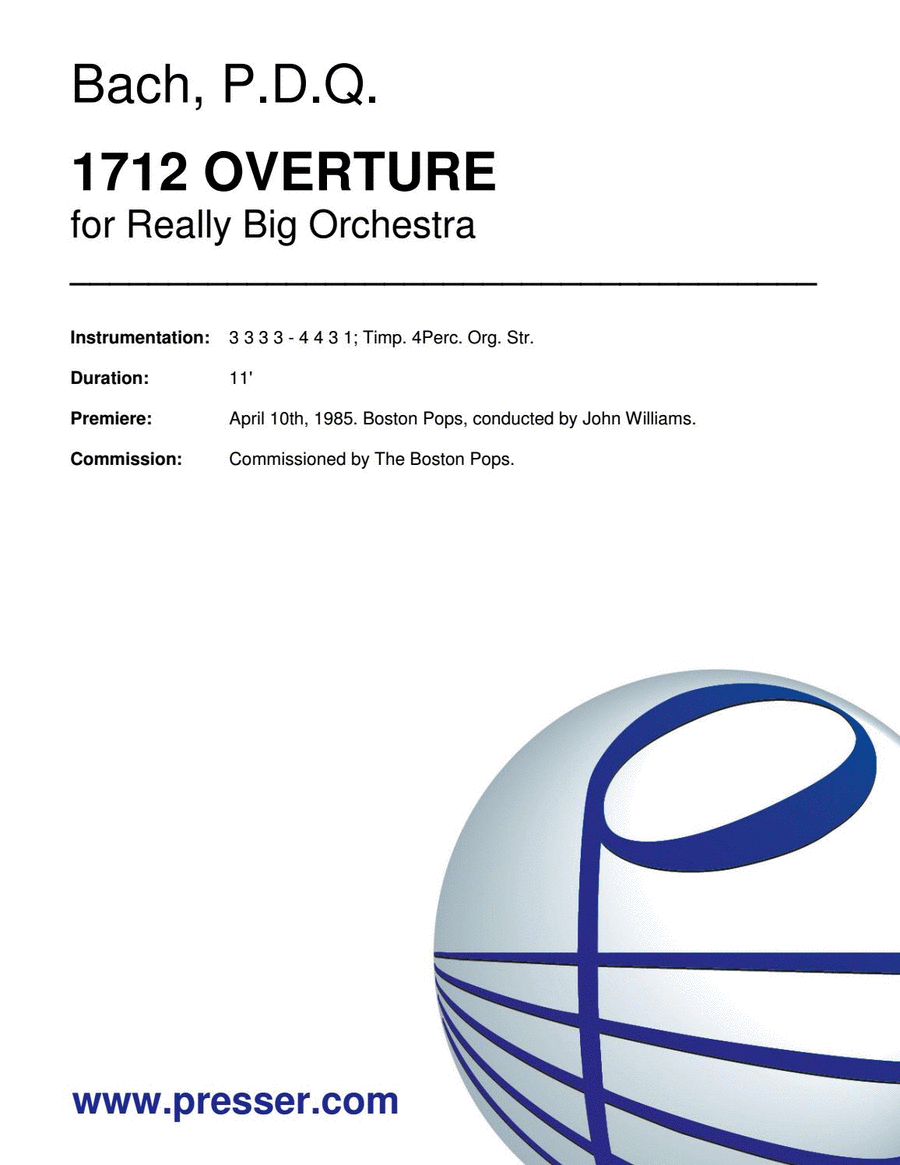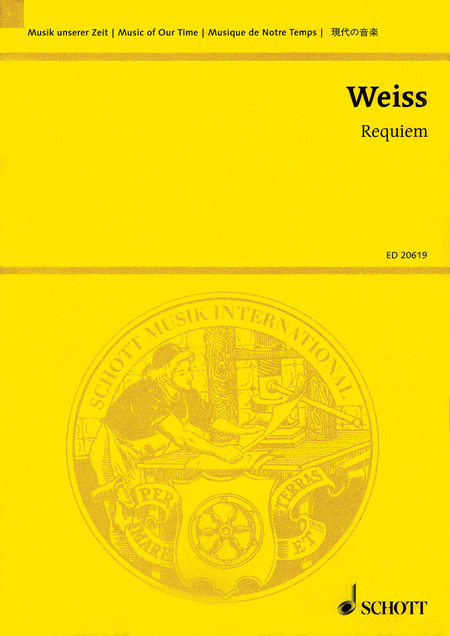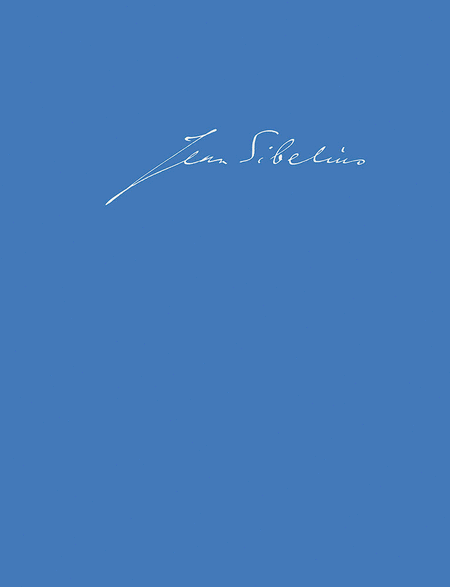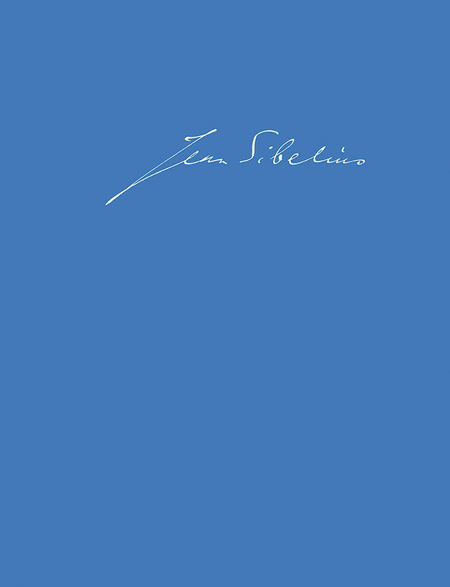|
| 1712 Overture
Orchestre
Theodore Presser Co.
Orchestra SKU: PR.416415760 For Really Big Orchestra. Composed by ...(+)
Orchestra SKU:
PR.416415760 For
Really Big Orchestra.
Composed by PDQ Bach.
Edited by Prof. Peter
Schickele. Study Score.
With Standard notation.
Duration 11 minutes.
Theodore Presser Company
#416-41576. Published by
Theodore Presser Company
(PR.416415760). UPC:
680160636532. 9 x 12
inches. The 1712
Overture stands out in
P.D.Q. Bach's oeuvre for
two reasons, among
others: it is by far the
most programmatic
instrumental piece among
those by the minimeister
of Wein-am-Rhein so far
unearthed, and 2) its
discovery has led to a
revelation about the
composer's father, Johann
Sebastian Bach, that has
exploded like a bombshell
on the usually serene
musicological landscape.
The overture is based on
an anecdote told to
P.D.Q. Bach by a cousin,
Peter Ulrich. Since P.U.
Bach lived in Dudeldorf,
only a few miles down the
road from Wein-am-Rhein,
he was P.D.Q.'s closest
relative, and he was, in
fact, one of the few
members of the family who
was on speaking terms
with P.D.Q. The story,
related to P.D.Q.
(fortunately for us
posterity types) in a
letter, may be summarized
thus: The town of
Dudeldorf was founded by
two brothers, Rudi and
Dieter Dudel, early in
the 18th century. Rudi
remained mayor of the
newborn burg for the rest
of his long life, but
Dieter had a dream of
starting a musicians'
colony, an entire city
devoted to music, which
dream, he finally
decided, could be
realized only in the New
World. In 1712, he and
several other bagpipers
sailed to Boston, never
to return to Germany.
(Henceforth, Rudi became
known as der deutscher
Dudel and Dieter as the
Yankee Dudel).
Unfortunately, the head
of the Boston Musicians'
Guild had gotten wind of
Dudel's plans, and
Wilhelm Wiesel (pron.
VEE-zle), known none too
affectionately around
town as Wiesel the
Weasel, was not about to
share what few gigs there
were in colonial America
with more foreigners and
outside agitators. He and
his cronies were on hand
to meet Dudel's boat when
it pulled into Boston
Harbor; they intended to
prevent the newcomers'
disembarkation, but Dudel
and his companions
managed to escape to the
other side of the bay in
a dinghy, landing with
just enough time to rent
a carriage and horses
before hearing the sound
of The Weasel and his
men, who had had to come
around the long way. The
Germans headed West, with
the Bostonians in furious
pursuit. soon the city
had been left far behind,
and by midnight so had
the pursuers; Dieter
Dudel decided that it was
safe for him and his men
to stop and sleep until
daybreak. When they
awoke, they found that
they were in a beautiful
landscape of low,
forested mountains and
pleasant fields, warmed
by the brilliant morning
sun and serenaded by an
entrancing variety of
birds. Here, Dudel
thought, her is where I
will build my colony. The
immigrants continued down
the road at a leisurely
pace until they came upon
a little church, all by
itself in the
countryside, from which
there suddenly emanated
the sounds of a pipe
organ. At this point, the
temptation to quote from
P.U. Bach's letter to
P.D.Q. cannot be
resisted: They went
inside and, after
listening to the glorious
music for a while,
introduced themselves to
the organist. And who do
you think it was? Are you
ready for this -- it was
your old man! Hey, no
kidding -- you know, I'm
sure, that your father
was the guy to get when
it came to testing new
organs, and whoever had
that one in Massachusetts
built offered old
Sebastian a tidy sum to
go over there and check
it out. The unexpected
meeting with J.S. Bach
and his sponsors was
interrupted by the sound
of horse hooves, as the
dreaded Wiesel and his
men thundered on to the
scene. They had been
riding all night,
however, and they were no
spring chickens to start
with, and as soon as they
reached the church they
all dropped, exhausted,
to the ground. The elated
Germans rang the church
bells and offered to buy
everyone a beer at the
nearest tavern. There
they were taught, and
joined in singing, what
might be called the
national anthem of the
New World. The melody of
this pre-revolutionary
patriotic song is still
remembered (P.D.Q. Bach
quotes it, in the bass
instruments, near the end
of the overture), but is
words are now all but
forgotten: Freedom, of
thee we sing, Freedom
e'er is our goal; Death
to the English King, Long
live Rock and Ross. The
striking paucity of
biographical references
to Johann Sebastian Bah
during the year 1712 can
now be explained: he was
abroad for a significant
part of that year,
testing organs in the
British Colonies. That
this revelation has not
been accepted as fact by
the musicological
establishment is no
surprise, since it means
that a lot of books would
have to be rewritten. The
members of that
establishment haven't
even accepted the
existence of P.D.Q. Bach,
one of whose major works
the 1712 Overture
certainly is. It is also
a work that shows
Tchaikowsky up as the
shameless plagiarizer
that some of us have
always known he was. The
discovery of this awesome
opus was made possible by
a Boston Pops Centennial
Research Commission; the
first modern performance
took place at the opening
concert of the 100th
anniversary season of
that orchestra, under the
exciting but authentic
direction of John
Williams. $39.99 - Voir plus => AcheterDélais: 2 to 3 weeks | | | |
| 1712 Overture
Orchestre
Theodore Presser Co.
Orchestra SKU: PR.41641576L For Really Big Orchestra. Composed by ...(+)
Orchestra SKU:
PR.41641576L For
Really Big Orchestra.
Composed by PDQ Bach.
Edited by Peter
Schickele. Large Score.
With Standard notation.
Duration 11 minutes.
Theodore Presser Company
#416-41576L. Published by
Theodore Presser Company
(PR.41641576L). UPC:
680160636549. 11 x 17
inches. The 1712
Overture stands out in
P.D.Q. Bach's oeuvre for
two reasons, among
others: it is by far the
most programmatic
instrumental piece among
those by the minimeister
of Wein-am-Rhein so far
unearthed, and 2) its
discovery has led to a
revelation about the
composer's father, Johann
Sebastian Bach, that has
exploded like a bombshell
on the usually serene
musicological landscape.
The overture is based on
an anecdote told to
P.D.Q. Bach by a cousin,
Peter Ulrich. Since P.U.
Bach lived in Dudeldorf,
only a few miles down the
road from Wein-am-Rhein,
he was P.D.Q.'s closest
relative, and he was, in
fact, one of the few
members of the family who
was on speaking terms
with P.D.Q. The story,
related to P.D.Q.
(fortunately for us
posterity types) in a
letter, may be summarized
thus: The town of
Dudeldorf was founded by
two brothers, Rudi and
Dieter Dudel, early in
the 18th century. Rudi
remained mayor of the
newborn burg for the rest
of his long life, but
Dieter had a dream of
starting a musicians'
colony, an entire city
devoted to music, which
dream, he finally
decided, could be
realized only in the New
World. In 1712, he and
several other bagpipers
sailed to Boston, never
to return to Germany.
(Henceforth, Rudi became
known as der deutscher
Dudel and Dieter as the
Yankee Dudel).
Unfortunately, the head
of the Boston Musicians'
Guild had gotten wind of
Dudel's plans, and
Wilhelm Wiesel (pron.
VEE-zle), known none too
affectionately around
town as Wiesel the
Weasel, was not about to
share what few gigs there
were in colonial America
with more foreigners and
outside agitators. He and
his cronies were on hand
to meet Dudel's boat when
it pulled into Boston
Harbor; they intended to
prevent the newcomers'
disembarkation, but Dudel
and his companions
managed to escape to the
other side of the bay in
a dinghy, landing with
just enough time to rent
a carriage and horses
before hearing the sound
of The Weasel and his
men, who had had to come
around the long way. The
Germans headed West, with
the Bostonians in furious
pursuit. soon the city
had been left far behind,
and by midnight so had
the pursuers; Dieter
Dudel decided that it was
safe for him and his men
to stop and sleep until
daybreak. When they
awoke, they found that
they were in a beautiful
landscape of low,
forested mountains and
pleasant fields, warmed
by the brilliant morning
sun and serenaded by an
entrancing variety of
birds. Here, Dudel
thought, her is where I
will build my colony. The
immigrants continued down
the road at a leisurely
pace until they came upon
a little church, all by
itself in the
countryside, from which
there suddenly emanated
the sounds of a pipe
organ. At this point, the
temptation to quote from
P.U. Bach's letter to
P.D.Q. cannot be
resisted: They went
inside and, after
listening to the glorious
music for a while,
introduced themselves to
the organist. And who do
you think it was? Are you
ready for this -- it was
your old man! Hey, no
kidding -- you know, I'm
sure, that your father
was the guy to get when
it came to testing new
organs, and whoever had
that one in Massachusetts
built offered old
Sebastian a tidy sum to
go over there and check
it out. The unexpected
meeting with J.S. Bach
and his sponsors was
interrupted by the sound
of horse hooves, as the
dreaded Wiesel and his
men thundered on to the
scene. They had been
riding all night,
however, and they were no
spring chickens to start
with, and as soon as they
reached the church they
all dropped, exhausted,
to the ground. The elated
Germans rang the church
bells and offered to buy
everyone a beer at the
nearest tavern. There
they were taught, and
joined in singing, what
might be called the
national anthem of the
New World. The melody of
this pre-revolutionary
patriotic song is still
remembered (P.D.Q. Bach
quotes it, in the bass
instruments, near the end
of the overture), but is
words are now all but
forgotten: Freedom, of
thee we sing, Freedom
e'er is our goal; Death
to the English King, Long
live Rock and Ross. The
striking paucity of
biographical references
to Johann Sebastian Bah
during the year 1712 can
now be explained: he was
abroad for a significant
part of that year,
testing organs in the
British Colonies. That
this revelation has not
been accepted as fact by
the musicological
establishment is no
surprise, since it means
that a lot of books would
have to be rewritten. The
members of that
establishment haven't
even accepted the
existence of P.D.Q. Bach,
one of whose major works
the 1712 Overture
certainly is. It is also
a work that shows
Tchaikowsky up as the
shameless plagiarizer
that some of us have
always known he was. The
discovery of this awesome
opus was made possible by
a Boston Pops Centennial
Research Commission; the
first modern performance
took place at the opening
concert of the 100th
anniversary season of
that orchestra, under the
exciting but authentic
direction of John
Williams. $80.00 - Voir plus => AcheterDélais: 2 to 3 weeks | | | |
| Requiem
Orchestre [Conducteur d'étude / Miniature]
Schott
Soprano, tenor, Knabensoprano, flugelhorn, mixed choir and chamber orchestra (St...(+)
Soprano, tenor,
Knabensoprano,
flugelhorn, mixed choir
and chamber orchestra
(Study Score) SKU:
HL.49018099 Boy
Soprano, Soprano, Tenor,
Flugelhorn, Mixed Chorus,
and Chamber Orchestra
Study Score. Composed
by Harald Weiss. This
edition: Paperback/Soft
Cover. Sheet music. Study
Score. Classical.
Softcover. Composed
2008/2009. 188 pages.
Duration 100'. Schott
Music #ED20619. Published
by Schott Music
(HL.49018099). ISBN
9790001158428. UPC:
884088567347.
8.25x11.75x0.457 inches.
Latin - German. On
letting go(Concerning the
selection of the texts)
In the selection of the
texts, I have allowed
myself to be motivated
and inspired by the
concept of 'letting go'.
This appears to me to be
one of the essential
aspects of dying, but
also of life itself. We
humans cling far too
strongly to successful
achievements, whether
they have to do with
material or ideal values,
or relationships of all
kinds. We cannot and do
not want to let go,
almost as if our life
depended on it. As we
will have to practise the
art of letting go at the
latest during our hour of
death, perhaps we could
already make a start on
this while we are still
alive. Tagore describes
this farewell with very
simple but strikingly
vivid imagery: 'I will
return the key of my
door'. I have set this
text for tenor solo. Here
I imagine, and have
correspondingly noted in
a certain passage of the
score, that the
protagonist finds himself
as though 'in an ocean'
of voices in which he is
however not drowning, but
immersing himself in
complete relaxation. The
phenomenon of letting go
is described even more
simply and tersely in
Psalm 90, verse 12: 'So
teach us to number our
days, that we may apply
our hearts unto wisdom'.
This cannot be expressed
more plainly.I have begun
the requiem with a solo
boy's voice singing the
beginning of this psalm
on a single note, the
note A. This in effect
says it all. The work
comes full circle at the
culmination with a repeat
of the psalm which
subsequently leads into a
resplendent 'lux
aeterna'. The
intermediate texts of the
Requiem which highlight
the phenomenon of letting
go in the widest spectrum
of colours originate on
the one hand from the
Latin liturgy of the
Messa da Requiem (In
Paradisum, Libera me,
Requiem aeternam, Mors
stupebit) and on the
other hand from poems by
Joseph von Eichendorff,
Hermann Hesse,
Rabindranath Tagore and
Rainer Maria Rilke.All
texts have a distinctive
positive element in
common and view death as
being an organic process
within the great system
of the universe, for
example when Hermann
Hesse writes: 'Entreiss
dich, Seele, nun der
Zeit, entreiss dich
deinen Sorgen und mache
dich zum Flug bereit in
den ersehnten Morgen'
['Tear yourself way , o
soul, from time, tear
yourself away from your
sorrows and prepare
yourself to fly away into
the long-awaited
morning'] and later: 'Und
die Seele unbewacht will
in freien Flugen
schweben, um im
Zauberkreis der Nacht
tief und tausendfach zu
leben' ['And the
unfettered soul strives
to soar in free flight to
live in the magic sphere
of the night, deep and
thousandfold']. Or Joseph
von Eichendorff whose
text evokes a distant
song in his lines: 'Und
meine Seele spannte weit
ihre Flugel aus. Flog
durch die stillen Lande,
als floge sie nach Haus'
['And my soul spread its
wings wide. Flew through
the still country as if
homeward bound.']Here a
strong romantically
tinged occidental
resonance can be detected
which is however also
accompanied by a
universal spirit going
far beyond all cultures
and religions. In the
beginning was the sound
Long before any sort of
word or meaningful phrase
was uttered by vocal
chords, sounds,
vibrations and tones
already existed. This
brings us back to the
music. Both during my
years of study and at
subsequent periods, I had
been an active
participant in the world
of contemporary music,
both as percussionist and
also as conductor and
composer. My early scores
had a somewhat
adventurous appearance,
filled with an abundance
of small black dots: no
rhythm could be too
complicated, no register
too extreme and no
harmony too dissonant. I
devoted myself intensely
to the handling of
different parameters
which in serial music
coexist in total
equality: I also studied
aleatory principles and
so-called minimal music.I
subsequently emigrated
and took up residence in
Spain from where I
embarked on numerous
travels over the years to
India, Africa and South
America. I spent repeated
periods during this time
as a resident in
non-European countries.
This meant that the
currents of contemporary
music swept past me
vaguely and at a great
distance. What I instead
absorbed during this
period were other
completely new cultures
in which I attempted to
immerse myself as
intensively as possible.I
learned foreign languages
and came into contact
with musicians of all
classes and styles who
had a different cultural
heritage than my own: I
was intoxicated with the
diversity of artistic
potential.Nevertheless,
the further I distanced
myself from my own
Western musical heritage,
the more this returned
insistently in my
consciousness.The scene
can be imagined of
sitting somewhere in the
middle of the Brazilian
jungle surrounded by the
wailing of Indians and
out of the blue being
provided with the
opportunity to hear
Beethoven's late string
quartets: this can be a
heart-wrenching
experience, akin to an
identity crisis. This
type of experience can
also be described as
cathartic. Whatever the
circumstances, my
'renewed' occupation with
the 'old' country would
not permit me to return
to the point at which I
as an audacious young
student had maltreated
the musical parameters of
so-called contemporary
music. A completely
different approach would
be necessary: an
extremely careful
approach, inching my way
gradually back into the
Western world: an
approach which would
welcome tradition back
into the fold, attempt to
unfurl the petals and
gently infuse this
tradition with a breath
of contemporary
life.Although I am aware
that I will not unleash a
revolution or scandal
with this approach, I am
nevertheless confident
as, with the musical
vocabulary of this
Requiem, I am travelling
in an orbit in which no
ballast or complex
structures will be
transported or intimated:
on the contrary, I have
attempted to form the
message of the texts in
music with the naivety of
a 'homecomer'. Harald
WeissColonia de San
PedroMarch 2009. $93.00 - Voir plus => AcheterDélais: 24 hours - In Stock | | | |
| Complete Works (JSW)
Orchestre
Breitkopf & Härtel
Orchestra SKU: BR.SON-627 Ouverture JS 145, Baletscen JS 163. Comp...(+)
Orchestra SKU:
BR.SON-627
Ouverture JS 145,
Baletscen JS 163.
Composed by Jean
Sibelius. Edited by Tuija
Wicklund. Linen. Complete
Works. Late-romantic;
Early modern. Complete
Works. 196 pages.
Breitkopf and Haertel
#SON 627. Published by
Breitkopf and Haertel
(BR.SON-627). ISBN
9790004803295. 10 x 12.5
inches. In 1998, at
the end of the 20th
century, Breitkopf &
Hartel started the
publication of the
Complete Edition, which
is made possible thanks
to the cooperation of the
various Sibelius
publishers. The Editors
(Helsinki University
Library and The Sibelius
Society of Finland) and
the Editorial Committee
(Chairman: Timo Virtanen,
Helsinki) believe that
the volumes of JSW will
provide the basis for a
now conception of the
creative work of Jean
Sibelius.Reviews: One
immediately recognizes
the towering production
quality of these volumes
- a point that can be
extended to all volumes
thus far published in the
set. The music is a joy
to read; and the lucidity
and thoroughness of the
texts … are models
of scholarly editions,
and should be required
reading for all
bibliography and
music-editing courses.
… In sum, the JSW
is a remarkable project:
the scholarship is
impeccable, the music
scores and texts are
simply a joy to study.
Edward Jurkowski, Notes
December 2011: 442-443At
the back of this
magnificent book are
pages of critical
commentary on a
bar-by-bar analysis of an
endless supply of musical
notation requiring
interpretation by the
editor. … For the
general, non-musically
trained, purchaser of the
edition there is the
magisterial introduction
to read, and fascinating
reading it is. Edward W.
Clark, Sibelius Society
Newsletter 2009 The
Sibelius pieces, however,
are a revelation. I
opened this magnificently
produced volume -
complete with
multilingual critical
report and generous
facsimiles of original
manuscripts - expecting
Grieg-style
quasi-nationalistic
character pieces, and was
instead presented with an
incredible array of
styles, textures,
harmonic languages and
levels of difficulty.
Chris White, Piano
Professional Summer 2009:
2This is not only a
scholarly edition of one
of the composer's major
works, it is also a model
for the philological
editing of music in
general. … JSW has
chosen to have the
emendations reflected in
two places, in certain
cases even in three: as
graphic indications in
the music text, in prose
form in the critical
commentary, and sometimes
also in the form of a
warning footnote on the
music page. There can be
no doubt that such a
procedure is very
user-friendly, but it
disturbs the appearance
of the music and may
mislead the user into
thinking that there are
two or more equally valid
readings. Niels Krabbe,
Fontes Artis Musicae
54/2, 2007: 248 Editorial
standards are high
throughout, and maintain
a careful balance between
the competing demands of
practical exigency and
the need to provide as
much scholarly evidence
of variants as possible.
The critical commentaries
provide concise and
effective descriptions of
the sources and, where
appropriate, information
on compositional genesis
and historical context.
The introduction to each
volume provide useful
background information on
historical reception,
including much new
material not previously
brought to light in
Tawaststjerna's
biography. Daniel M.
Grimley,
Nineteenth-Century Music
Review 2/2, 2005:
244. $269.95 - Voir plus => AcheterDélais: 3 to 4 weeks | | | |
| Complete Works (JSW)
Orchestre
Breitkopf & Härtel
Orchestra SKU: BR.SON-625 Scenes historiques op.25, op.66. Compose...(+)
Orchestra SKU:
BR.SON-625 Scenes
historiques op.25,
op.66. Composed by
Jean Sibelius. Edited by
Kari Kilpelainen. Linen.
Complete Works.
Late-romantic; Early
modern. Complete Works.
228 pages. Breitkopf and
Haertel #SON 625.
Published by Breitkopf
and Haertel (BR.SON-625).
ISBN 9790004803271. 10
x 12.5 inches. In
1998, at the end of the
20th century, Breitkopf &
Hartel started the
publication of the
Complete Edition, which
is made possible thanks
to the cooperation of the
various Sibelius
publishers. The Editors
(Helsinki University
Library and The Sibelius
Society of Finland) and
the Editorial Committee
(Chairman: Timo Virtanen,
Helsinki) believe that
the volumes of JSW will
provide the basis for a
now conception of the
creative work of Jean
Sibelius.Reviews: One
immediately recognizes
the towering production
quality of these volumes
- a point that can be
extended to all volumes
thus far published in the
set. The music is a joy
to read; and the lucidity
and thoroughness of the
texts ... are models of
scholarly editions, and
should be required
reading for all
bibliography and
music-editing courses.
... In sum, the JSW is a
remarkable project: the
scholarship is
impeccable, the music
scores and texts are
simply a joy to study.
Edward Jurkowski, Notes
December 2011: 442-443At
the back of this
magnificent book are
pages of critical
commentary on a
bar-by-bar analysis of an
endless supply of musical
notation requiring
interpretation by the
editor. ... For the
general, non-musically
trained, purchaser of the
edition there is the
magisterial introduction
to read, and fascinating
reading it is. Edward W.
Clark, Sibelius Society
Newsletter 2009 The
Sibelius pieces, however,
are a revelation. I
opened this magnificently
produced volume -
complete with
multilingual critical
report and generous
facsimiles of original
manuscripts - expecting
Grieg-style
quasi-nationalistic
character pieces, and was
instead presented with an
incredible array of
styles, textures,
harmonic languages and
levels of difficulty.
Chris White, Piano
Professional Summer 2009:
2This is not only a
scholarly edition of one
of the composer's major
works, it is also a model
for the philological
editing of music in
general. ... JSW has
chosen to have the
emendations reflected in
two places, in certain
cases even in three: as
graphic indications in
the music text, in prose
form in the critical
commentary, and sometimes
also in the form of a
warning footnote on the
music page. There can be
no doubt that such a
procedure is very
user-friendly, but it
disturbs the appearance
of the music and may
mislead the user into
thinking that there are
two or more equally valid
readings. Niels Krabbe,
Fontes Artis Musicae
54/2, 2007: 248 Editorial
standards are high
throughout, and maintain
a careful balance between
the competing demands of
practical exigency and
the need to provide as
much scholarly evidence
of variants as possible.
The critical commentaries
provide concise and
effective descriptions of
the sources and, where
appropriate, information
on compositional genesis
and historical context.
The introduction to each
volume provide useful
background information on
historical reception,
including much new
material not previously
brought to light in
Tawaststjerna's
biography. Daniel M.
Grimley,
Nineteenth-Century Music
Review 2/2, 2005:
244. $310.95 - Voir plus => AcheterDélais: 3 to 4 weeks | | |
|
